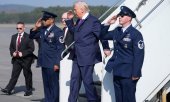After five postponements, the Romanian Constitutional Court finally approved the planned reform of pensions for judges and prosecutors last week. The current system provides for pensions of up to 5,000 euros per month and retirement from the age of 48. The implementation of the reform is a condition for the disbursement of EU funds.
The US Supreme Court has ruled that the tariffs imposed by President Donald Trump on the basis of an emergency law are illegal. Following the decision Trump, invoking a trade law, issued a decree imposing new tariffs of 10 percent and then announced an increase to 15 percent. These tariffs can remain in place for a maximum of 150 days and can only be extended with the approval of Congress.
Prime Minister Rob Jetten's new government has been sworn in in the Netherlands today after his left-liberal party, D66, won a narrow victory against the right-wing populist PVV in elections last October. Following lengthy negotiations, D66 and the centre-right parties VDD and CDA have agreed to form a minority government. The national press examines the chances of this coalition being able to pursue constructive policies.
The southern branch of the Druzhba pipeline, which until recently supplied Slovakia and Hungary with Russian oil, has been damaged since the end of January. According to reports from Kyiv, the installation on Ukrainian territory was targeted by Russian attacks. Slovakian Prime Minister Robert Fico has accused the Ukrainian government of deliberately delaying deliveries. For its part Hungary is again threatening to veto aid that has already been approved to Ukraine.
Andrew Mountbatten-Windsor, brother of British King Charles III, was taken into custody and questioned by police for about 12 hours on Thursday on suspicion of misconduct in public office. He is accused of passing confidential documents to Jeffrey Epstein while serving as UK trade envoy. Sexual offences are not mentioned in the official statement on the arrest of the former prince, who has been implicated in the Epstein scandal.
US President Donald Trump has upped the pressure on Iran to reach an agreement in the dispute over Tehran's nuclear programme. If no solution is found within 10 to 15 days "bad things" will happen, he warned. Iran has announced a "resolute and appropriate" response in the event of an attack. Commentators discuss the consequences of a US attack for the region.
The deputy director of the Spanish National Police resigned on Wednesday after it emerged that he was under investigation for sexual assault after a policewoman under his command filed a complaint. She has accused her superior of sexually assaulting her in April 2025 in an official residence belonging to the Ministry of the Interior. For the national press, the case points to systemic problems in Spain.
With just a month to go before local elections in France, the death of a suspected right-wing extremist student has sent shock waves through the country. According to French prosecutors, Quentin D. was beaten by several attackers and sustained lethal injuries on 12 February in Lyon on the sidelines of a protest against Rima Hassan, MEP of the left-wing LFI. The French government holds the LFI-affiliated militant group Jeune Garde responsible for the attack.
Talks in Geneva between representatives of Ukraine and Russia, attended by the United States, have ended after two days. Russia's chief negotiator, Putin adviser Vladimir Medinsky, described the talks as "difficult, but business-like", while in an interview Ukrainian President Volodymyr Zelensky spoke of progress on military issues. However no concrete results have been announced so far.
The election campaign in Hungary is becoming increasingly heated in the run-up to the parliamentary elections on 12 April. While opposition leader Péter Magyar has said that Prime Minister Viktor Orbán is capable of nothing more than "incitement" and "threats", Orbán has described Magyar's conservative Tisza Party as a "creation of foreign powers". Orbán has been endorsed by US Secretary of State Marco Rubio, who told him: "Your success is our success."
A court case is underway in the US to determine whether social media platforms deliberately design their websites to be addictive. Meta CEO Mark Zuckerberg admitted in Los Angeles that there had been temporary shortcomings in the age verification process on his platforms, but opposed restrictions such as a ban on beauty filters.












